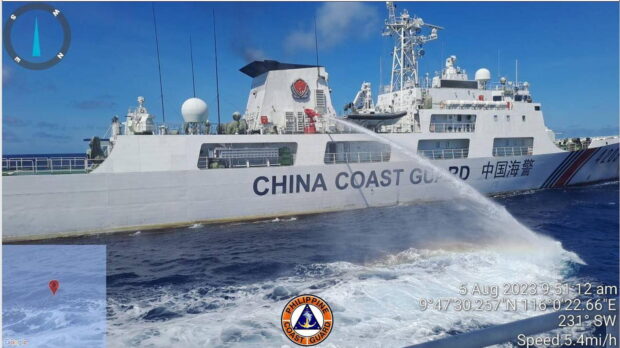Too early to invoke US-PH Mutual Defense Treaty after China’s water cannon attack — DFA

A China Coast Guard (CCG) ship on Saturday is seen preparing to strike a Philippine Coast Guard (PCG) vessel with a water cannon as it is on its way to Ayungin (Second Thomas) Shoal. (PHOTO FROM THE PCG FACEBOOK PAGE)
MANILA, Philippines — The Department of Foreign Affairs (DFA) on Monday said it is “a bit early” to invoke the Mutual Defense Treaty (MDT) between the Philippines and the United States in view of the China Coast Guard’s water cannon attack against Philippine vessels over the weekend.
“In terms of the specific question whether it warrants the invoking of the Mutual Defense [Treaty], I think it’s a bit early,” said DFA spokesperson Teresita Daza in a press conference.
Signed by two parties on August 30, 1951, the MDT states that both countries would support each other if an external party attacked either the Philippines or the United States.
According to the US Department of Defense, Articles IV and V of the MDT states that “an armed attack in the Pacific, including anywhere in the South China Sea, on either of their public vessels, aircraft, or armed forces — which includes their Coast Guards — would invoke mutual defense commitments.”
Article continues after this advertisementBut Daza pointed out that the MDT provisions on “public vessels” remains unclear.
Article continues after this advertisement“Here, we deal with the concept of what constitutes an armed attack in the Pacific, but there is no clear definition as to what defines ‘public vessels’ in the MDT,” she said.
Daza also noted Washington’s public affirmation of its “ironclad commitment” to the defense of the Philippines.
In a statement on Sunday, the Philippine Coast Guard said the a China Coast Guard vessel fired a water cannon at a PCG vessel and a supply ship delivering food, water, fuel and other supplies to military personnel stationed on BRP Sierra Madre in Ayungin Shoal on Saturday,
gsg
For comprehensive coverage, in-depth analysis, visit our special page for West Philippine Sea updates. Stay informed with articles, videos, and expert opinions.